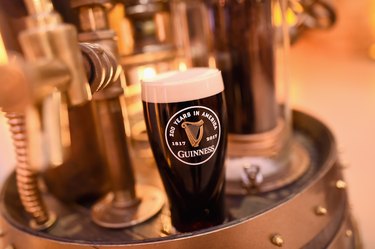
Some people might think there's nothing better than a beer diet. And if it consists of Guinness, it's an added bonus for them. Famous worldwide for its bold taste and body, Guinness is a stout beer created in Dublin, Ireland, in 1759. It was first brewed in the St. James Brewery.
Through the decades, advertisements have claimed health benefits. As early as 1931, the "Good for You" campaign ran: "Seven glasses, seven days of the week and seven beneficial reasons to drink Guinness (for strength, nerves, digestion, exhaustion, sleeplessness, tonic effects and the blood)."
Video of the Day
Video of the Day
In Ireland, blood donors and post-operative patients are given a pint of Guinness to help them recover, according to FoodNetwork.com, exemplifying the health belief associated with Guinness.
But, making Guinness the core of your diet to promote your health is quite a stretch.
What's the Guinness Diet?
The Guinness diet is a liquid diet that consists of only drinking Guinness for nutrition and sustenance. No other foods are consumed due to the belief that Guinness is nutritionally complete in itself.
The diet is not promoted by the Guinness company or by any reputable lifestyle health or diet companies, but rather appears to be a beer myth. Moreover, any weight loss experienced by this so-called diet is likely water loss and due to the fact that you're not really consuming any solid food.
Guinness Brews
Guinness brews are a staple in the diet. Types of Guinness beer that you may be familiar with include Guinness Original Stout Draft, Guinness Extra Stout, Foreign Extra Stout and Guinness Draught. Stouts tend to be more bitter due to the fact that they contain additional hops in their ingredients.
Nutrition Information
A 12-ounce serving of Guinness Draft contains 125 calories, 9.4 grams of carbohydrates, and 0 grams of fat, according to Guinness. It has an alcohol content of 4.2 percent.
A 12-ounce serving of Guinness Extra Stout contains 180 calories, 11 grams of carbohydrates, 0 grams of fat and an alcohol content by volume of 5.6 percent, according to Guinness. A 12-ounce serving of Foreign Extra Stout contains 194 calories, 15 grams of carbohydrates, 0 grams of fat and an alcohol content by volume of 7.5 percent, according to Guinness.
As far as other nutrients, though, Guinness only has trace amounts. It does have a little calcium, the entire complex of B vitamins — except B12 — and 0.3 milligrams of iron per pint. Guinness is also rich in antioxidants, which help fight inflammation in the body.
Although it's nice that a beer can offer a little nutrition, this isn't enough to carry you through life with a healthy body. You need a variety of foods to get the full array of vitamins and minerals you need to support your internal organs, smooth skin and hair and strong muscles.
Precautions
Despite claims that this thick and dark Irish brew is nutritionally complete, the drink obviously lacks essential nutrients and components of a regular, solid food diet. This diet does not provide essential building blocks for the body, such as protein and fats.
Moreover, the Guinness diet certainly does not adhere to the health adage of moderate consumption of alcohol. Specifically, the recommended amount of alcohol for an American woman is one drink daily, and two drinks for an American man, according to the U.S. Dietary Guidelines for Americans. Drinking more can compromise your health.